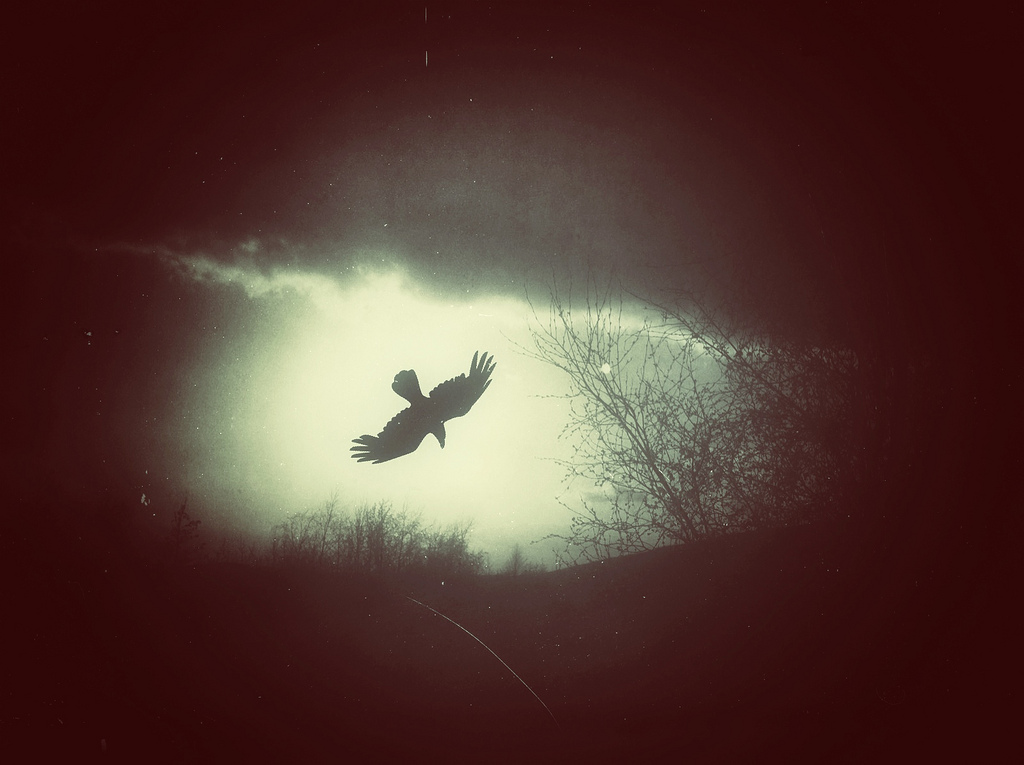Essay by Lorraine Berry
“Blackbird Singing in the Dead of Night…”
I always imagined that when I lost a parent, I’d keen and wail, that I couldn’t keep it a secret—that I’d have to let everyone know my world had been destroyed. I would take to the sky like a crow and caw my grief for all to hear.
Yet, last spring and summer, my voice—and my writing—deserted me. Before then, I’d had no idea that I could become so wordless. A blackbird, yes, but trapped in a black night, turned colorless and silent.
In April, several bad things sparked almost simultaneously. By mid-June, my father had died at the age of 71 of pancreatitis. I’d just turned 50. I’d run out of the adrenaline that kept me on my feet during his brief and brutal hospitalization. I’d already crashed after finishing a punishing year of teaching.
Writing had been my savior for many years, the thing that made other parts of my life tolerable. But this summer, the words would not come. After my father's death, during the three weeks I stayed with my mother, I wrote in my journal every day—but only about what was missing:
It feels as if someone has severed my fingertips from my brain so that the activity that has become so ingrained as to be muscle memory has been lost. I’ve had a stroke without having had a physical stroke. Someone has, with the stroke of an axe, severed the tools of my trade—my hands—from my brain, and I cannot write anything down.
I began this essay months ago. I’ve eked it out at last, but writing about my father is still painful, like brushing steel wool over raw flesh. In first drafts, I had to abandon the effort for days at a time. Then I’d pick it up again, only to be disappointed when the words I read on the page were no better than I remembered. I panicked.
My writer's block was not block. It was blankness. As quickly as I formed the words in my brain to transmit to my fingers, it felt as if another hand was right behind, erasing them from the chalkboard.
This profound loss, this feeling of a slate constantly wiped clean, conjured selah—a Hebrew word of unknown origin that appears in a number of psalms. Selah means "pause, and reflect on that," as in Psalm 88:
Selah
Thou hast put away mine acquaintance far from me; thou hast made me an abomination unto them: I am shut up, and I cannot come forth.
• • •
Until April, my dad was a healthy man who hiked three miles a day with his dogs and worked out on a weight bench. Before he became ill, I had only, in brief moments, considered my parents' mortality. I’d always been able to put off those thoughts by thinking of them as both young and healthy.
I joined my parents for my fiftieth birthday on May 9. It was my second trip down to Florida since my father had become ill in April. After his first attack of pancreatitis, when he spent three weeks in the hospital, we all assumed he was on the mend. Although he was still heavily medicated, my father was all smiles on my birthday. He and my mother gave me one of my grandmother's rings—a cluster of garnets on a gold band that she’d been given by her parents in the 1920s.
A week later, just before I flew back to my family in New York, he hugged me. "I don't want you to go," he whispered in my ear.
I promised him then that I would be back as soon as I could. I kissed him, sure that the next time I saw my father, he would be less addled, more himself.
My partner Rob and I traveled to Scotland at the end of May, a long-planned trip that my mother insisted we go on. But during the week and a half we were traveling, my father’s health failed; suddenly, he had a massive infection. He was re-hospitalized. Then he entered home hospice care a few days before I flew back to Florida.
By the time I returned on June 11, my family and I had decided to move him again—from home to a hospice bed at the hospital. My father was in too much pain for us to manage on our own. The aide who visited him daily was tender, but he moaned in agony as she sponge-bathed him.
I rode in the transport vehicle with him to the hospital. Even though the driver took an alternate route to avoid rougher roads, my father never stopped crying out. All I could do was hold his arm, which had slipped off the gurney, and talk to him. I was afraid that if I stopped talking, his pain would become worse. I kept assuring him that we were getting help.
The doctors had speculated that he had three weeks left. Instead, he died two days after my arrival.
It was June 13. A Thursday. 6:13 a.m. I sat with his body, while various family members came in and out to speak to him one last time.
After everyone had left the room, I lay down on the couch. I fell asleep, just the two of us there, each lost to the other, and yet, I felt so close to him then.
A gentle hand on my shoulder woke me later that morning. A new nurse had come on duty, and he spoke to me as I lay there groggily. I saw my father's corpse on the bed, but it felt as if someone had drawn a curtain between him and me.
"I'm afraid it looks like your father has passed," the nurse said.
“I know. I just wanted to keep him company.” I said. “Thank you.”
Now embarrassed, the nurse left the room.
My father wasn't any less dead. But something had happened to my feelings while I slept. Before, there had been tremendous sadness; now, there was nothing. I felt numb. The rock had been rolled in front of my own tomb.
Thy wrath lieth hard upon me, and thou hast afflicted me with all thy waves. Selah.
• • •
In the immediate days following his death, I had an obituary to write, letters to send to his business email list, a eulogy. I did this all with great energy, as if these ritualized acts of writing were the only outlet for the grief that hid itself from me.
I wrote so much for my father's obituary that I had to cut it by half. (Newspapers charge by the word, and the original was well over what I could afford.) I had to cut the streams of words I generated for his eulogy, too, worried that when I stood up in front of his friends and family, I’d never stop talking about my dad.
But when I tried to write anything else, the only thing that emerged on paper was anger. I felt rage—at the doctors, about all the miscommunications regarding hospice care, about the amount of pain my father had been in—all of it just kept unspooling in long screeds that I never showed anyone.
A few days after he died, I became convinced I’d screwed up as his daughter. I could have been more proactive in ending his pain, I accused myself. I'd let him suffer.
That thought haunted me for weeks after the memorial service, after we had put my mother on a plane back to her native England to stay with friends, after I returned home to slump on the couch in my living room.
I’d begin to write an essay about how I had failed him, get partway, then stop.
I tried a different tack—just writing about his death—but each time, I spewed out paragraphs that I knew didn't make sense except to me.
Finally, I got up one morning, and there was nothing. No words. I had no feelings and no words. I spent the entire month of July on the couch.
Thou hast laid me in the lowest pit, in darkness, in the deeps.
• • •
The last time I remember having such severe writer's block was while I wrote my dissertation in the late 1990s. I’d begun to realize that I didn't want to complete my Ph.D. My brain refused to cooperate in a program that depressed me more every day.
But when a lover of mine died of an aneurysm in 2006, I was unable to stop writing. I developed what neurologist Alice Flaherty calls "hypergraphia” in her 2004 book The Midnight Disease: The Drive to Write, Writer’s Block, and the Creative Brain. Flaherty draws strong connections between the limbic system, where our emotions lie, and the uncontrollable urge to write. This made sense to me at the time, and it still does.
Yet, here I sit, my avenue of release closed off in a way I never expected. Working on the first drafts of this essay, my chest became tight. Tears burned my eyes, even if they refused to come. I was afraid. I’m still afraid.
What if I’m stuck here forever? What if, every time I start to write something, the only words that tumble out are about my father? What if I can never find the words to express how this experience has derailed me?
I tried stealing from others, avidly picking apart their words for meaning, resonance, absolution. It is, after all, how crows survive—scavenging what they can—and crows have their own dialects. I knew I needed to find a new dialect to express my grief, so I started borrowing where I could. We played Beatles and Sam Cooke tunes at my father's memorial service, and those lyrics have accompanied me on this journey. Poems, too. Snatches of dialogue that I hear on TV or in a movie.
At this moment, it’s been about five months since my father's death, and his birthday was last week. That's a mere snapshot of time in ordinary circumstances, yet, in relative terms, it feels as if he died years ago. I've finally returned a childhood photo of him to its place on the bookshelf at the top of the stairs. It had been too painful to look at before, but now I see him as a smiling boy. I'm trying to replace the image that feels stuck inside my head—Dad on his deathbed—with that boy.
Although I’ve once again begun to write, the echoes of his death continue to overpower any words that venture forth:
LORD, I have called daily upon thee, I have stretched out my hands unto thee.
Wilt thou shew wonders to the dead? shall the dead arise and praise thee? Selah.
I am not a religious person, but Psalm 88 captures the sense of melancholia that overtook my summer, stilled my pen, caused me to misplace my sense of myself as a writer. I’m a daughter who has lost the words I learned at my father's side, sitting up with him late into the nights when I was three and four as he taught me to read.
Outside, I hear the jays and the crows scream out their morning greetings. When I close my eyes, I see their scratchings as they walk across an imagined blank page and wonder if they make more sense than what I’ve put together here. I read Wallace Stevens, cocking my head, observing my inner darkness:
I know noble accents
And lucid, inescapable rhythms;
But I know, too,
That the blackbird is involved
In what I know.
I steal what I cannot yet summon myself. And I wait.
Publishing Information
- “Blackbird singing in the dead of night” is from the song “Blackbird” by John Lennon and Paul McCartney, originally recorded in 1968.
- Psalm 88, "Book of Psalms," King James version of the Bible. (Click on the New International Translation of Psalm 88 for the full text.)
- “Ken Berry: Obituary” by Lorraine Berry, Daytona-Beach News Journal, June 16, 2013.
- The Midnight Disease: The Drive to Write, Writer's Block, and the Creative Brain by Alice W. Flaherty (Houghton Mifflin: 2004).
- Excerpt from "Thirteen Ways of Looking at a Blackbird," by Wallace Stevens, from the collection Harmonium (Knopf, 1923).
Art Information
- "Crow's Fall" © Robert Crom; Creative Commons license.
- "Crows" © Mary Bailey; Creative Commons license.
 Lorraine Berry is an associate editor at Talking Writing.
Lorraine Berry is an associate editor at Talking Writing.
Lorraine says she’s been fortunate to work with editors at TW like Martha Nichols, who, sensing that she had things to say but not the wherewithal to get them down in an order that made sense, worked with her to craft this piece.


